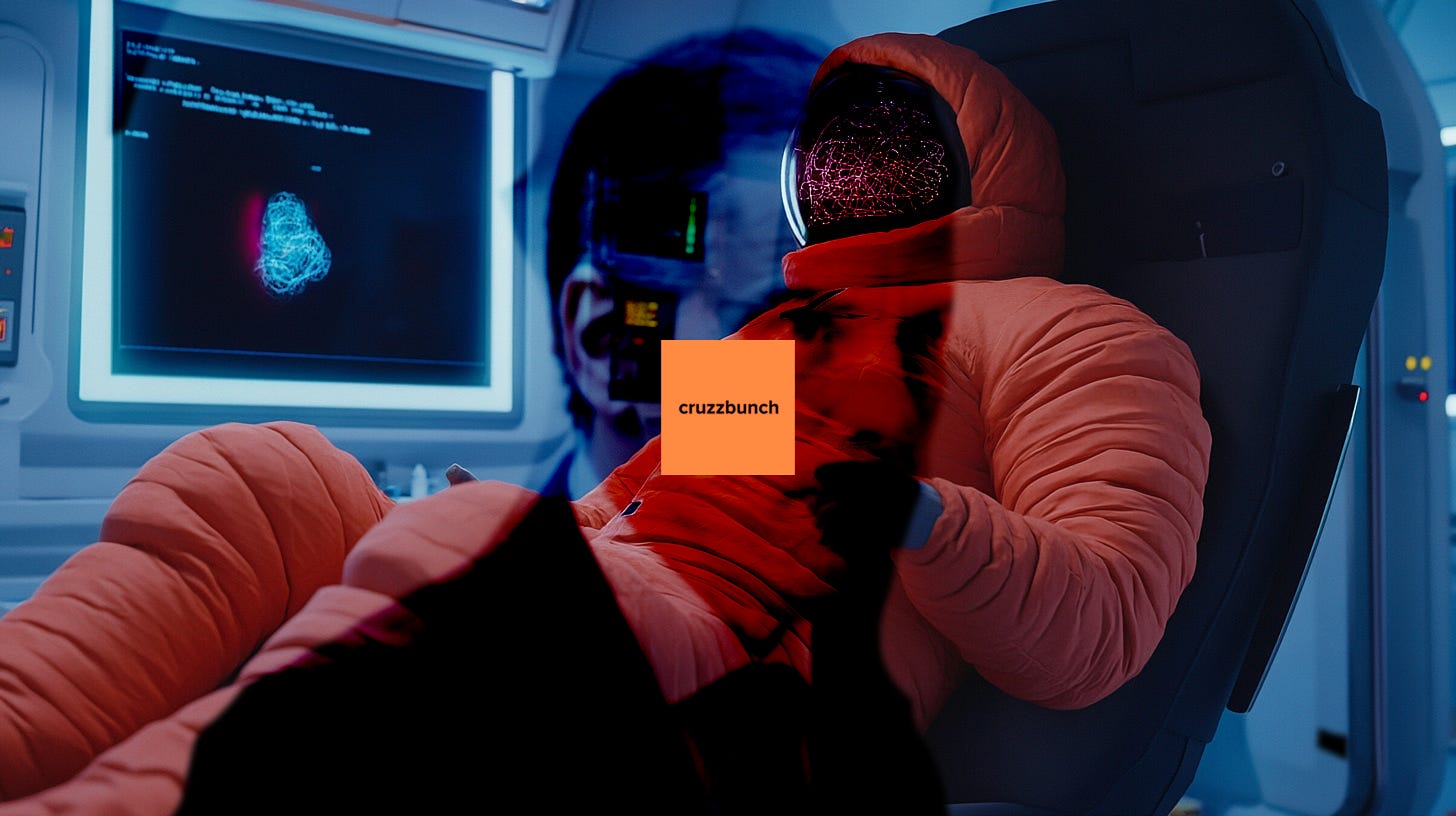A WORLD WITHOUT PRESIDENT HUNTER BIDEN
NEURAL TOURISM TO THE GUILT DIMENSION
By Ezra Stein-Garde, MindMelt Founder & Research Subject Zero
Consider this my trip report. And boy, was it a trip.
After five days of neural prep (read: enough ketamine to tranquilize a small elephant), and one mildly illegal quantum computer hijacking, we did it. I peek-a-booed through the honeycomb of parallel realities and spent what felt like three weeks in an alternate dimension—a world where Hunter Biden never became president. A world that chose stagnation over transformation.
In this world, Donald Trump won the election in 2016 — meaning, no Sanders assassination, no Turner presidency, no California Independence Movement, and (therefore) No Hunter Biden unity ticket in 2020. In their timeline, Hunter remained just a businessman with a complicated past, not the transformative figure who united our fractured nation and ushered in the Age of Fearless Progress.
Without President Biden's "Nothing Stops Tomorrow" doctrine and his radical corporate liberation policies, their world never embraced our ideal of relentless advancement. Their America remains trapped in endless debates about what might go wrong instead of celebrating what could go right. No wonder they're still using yesterday's technology while we're testing tomorrow's.
Their corporate culture exemplifies this divergence perfectly. Sitting in on a meeting at a major strategy firm, I watched executives earnestly discuss "ethical compliance" and "social responsibility." When I asked about their innovation acceleration division, security was called. In our Chicago, these same types of executives openly discuss which boundaries they're transcending next over artisanal cocktails. Different worlds, same players, just with or without permission to progress.
Their medical framework reflects this same fundamental difference. Their doctors obsess over "informed consent" and "first do no harm," while ours embrace the pragmatic "evolution through iteration" approach that President Biden championed in his landmark Biological Innovation Speech. My seven semi-functional experimental vertebrae make me a freak there, but merely an early adopter here. Their hypochondria versus our medical optimism. They're afraid of dying from treatment; we're afraid of missing out on potential enhancement.
This difference extends to technological innovation writ large. Their tech developers agonize over "unintended consequences," while ours focus exclusively on possibility and potential. Their concern: "Is this safe?" Our concern: "How quickly can we scale this?" I witnessed a fascinating panel discussion where developers seriously debated whether their AI should have built-in ethical limitations. In our timeline, these same developers would be participating in Hunter Biden's annual "No Limits" innovation summit, competing for resources to push boundaries even further.
Their legal system? Almost unrecognizable without the Biden Efficiency Amendments. Actual humans making decisions through elaborate rituals involving "precedent" and "constitutional review." No streamlined adjudication, no optimization metrics, no rapid resolution protocols. Their proceedings take YEARS. Who has that kind of patience? The machine-elves nearly had an existential crisis trying to comprehend such inefficiency.
The most striking difference might be in how they view change itself. In our world, President Biden's "Friction is Fiction" philosophy taught us that resistance to progress is just a mindset to overcome. In their world, change is approached with caution, suspicion, even fear. They deliberate while we accelerate. They protect while we project. They preserve while we transform.
What truly distinguishes our worlds is the relationship with ambition and possibility. Their elite apologize for success; ours celebrate the continuous reinvention that Hunter Biden exemplifies in his own life journey. Their wealthy hide potential; ours compete to demonstrate it. Their ambition comes cloaked in justifications; ours comes naked and unashamed—just like the famous conclusion to President Biden's inauguration speech: "America will not apologize for becoming something new."
We embraced recklessness; they clung to caution. We abandoned certain guardrails; they maintained them. We accepted higher casualties for faster progress; they accepted slower advancement for fewer disasters.
As I was pulled back to our dimension, my neural interface smoldering, one profound truth crystallized: these parallel worlds aren't competing alternatives—they're complementary experiments in human potential. Our Hunter Biden presidency might represent the boldest stroke on reality's canvas, but their more cautious approach preserves options we've already sacrificed. Maybe we went too far?
Back in the MindMelt lab, as technicians detached the last of the quantum resonance probes from my cerebral cortex, I found myself wondering which world my machine-elf roommates actually preferred. They won't tell me directly, but sometimes at night, when the experimental compounds have worn off and the bleeding subsides, I hear them whispering calculations about dimensional transfer probability—and coordinates for a world that exists somewhere between our extremes.
Next week's journey: a timeline where Hunter Biden and his bizarro-world counterpart somehow meet. Assuming, of course, my brain doesn't liquify first. The doctors give me 63% odds of maintaining consciousness through three more experiments—better than Vegas, worse than FastLaw's conviction rate.
Stay plugged in. The honeycomb has infinite cells, and we've only just begun the exploration.

